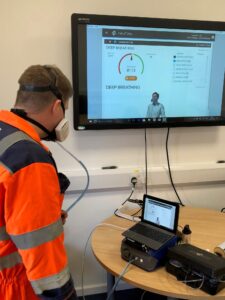Why Face Fit Test ?
For Respiratory Protective Equipment to be suitable it must be matched to the job, the environment, the anticipated airborne contaminant exposure level, and the wearer.
A Face Fit Test refers to the process of checking Respiratory Protective Equipment to see if it offers adequate levels of protection to the wearer. If you work in an industry where you are required to wear respiratory protective equipment, then a face fit test is essential.
The Face Fit Test Conforms to OSHA, CSA, HSE INDG, ANSI/ASTM, ISO, INRS and JIS standards and accepted for all Full-facepiece and Half-facepiece tight fitting elastomeric respirators, including NIOSH Series -95 /-99 /-100; EN -FFP1 / -FFP2 / -FFP3 filtering facepiece respirators.
It will safeguard your health
If RPE is not worn properly, it will not provide the required protection. Face fit testing is designed to provide workers with the best protection against the effects of hazardous materials. It can ensure the best possible seal to your face, reducing the chances of any dangerous particles entering the mask and being inhaled.
Respiratory protective equipment is essential to reduce the risk of work-related illness and death. For example, asbestos is a leading cause of lung cancers like mesothelioma. However, you can’t be sure of your mask’s effectiveness without it being tested by a competent, experienced testing operative.
It’s required by law
Anybody who wears a tight or close fitting mask to work is legally required to undergo a face fit test. They should have a certificate to prove any tight-fitting mask offers them adequate levels of protection. This includes half masks (disposable and reusable), powered respirators and full face masks.
Regulations such as COSHH (Control of Substances Hazardous to Health), CAR (Control of Asbestos Regulations) and CLaW (Control of Lead at Work) all state that face fit testing should be a part of the initial mask selection process.
You need a new mask
As previously mentioned, leading regulators state that a face fit test should be the deciding factor in choosing your new mask. This is important to ensure that the chosen Respiratory Protection Equipment provides the best level of protection for the individual.
When purchasing new face masks, employers may be tempted to buy their Respiratory Protective Equipment in bulk. However as everyone has a different face shape, a one-size-fits-all approach could leave some workers exposed to the effects of harmful dust and chemicals. Face fit testing can be carried out in large groups for convenience, and by taking the extra time the employer can comply with regulations and keep staff protected.
Your face has significantly changed since your last test
The initial process isn’t the only time in which you might need a face fit test. If your face shape changes a considerable amount, for example if you obtain an injury where the seal is located or if you lose or put on weight, it can affect the level of protection offered. You should consider booking yourself/your employee in for another face fit test whenever you feel the area around the seal has undergone a change.
You haven’t been tested for a long time
The Health and Safety Executive (HSE) aims to improve the standards of workers. They state that RPE “should be suitable for the intended use” and it “should be properly stored, cleaned and checked regularly to ensure it remains effective.”
Even if you feel that your face hasn’t undergone any significant changes, it is still recommended that you partake in regular face fit tests. These should take place every 1-3 years to ensure that your mask is still providing you with the correct level of protection. Often, subtle changes to the face might seem unnoticeable. However, they can become significant over time, making your equipment less effective.
Face fit testing offers workers security whilst working in environments containing hazardous materials. It offers employer a clear conscience as well as proven compliance with relatable health and safety regulations.
Respirators protect workers from breathable hazards in the workplace. Fit testing evaluates the seal between a respirator and the face, identifying gaps or leaks that put workers at risk.
| Certificate | Fee INR | Duration | Timing | Date Commence | Remarks |
|---|---|---|---|---|---|
| Face Fit Test | 7,000 | 1 Hour | 10:00-18:00 | Everyday | On TSI 8048 Machine |

